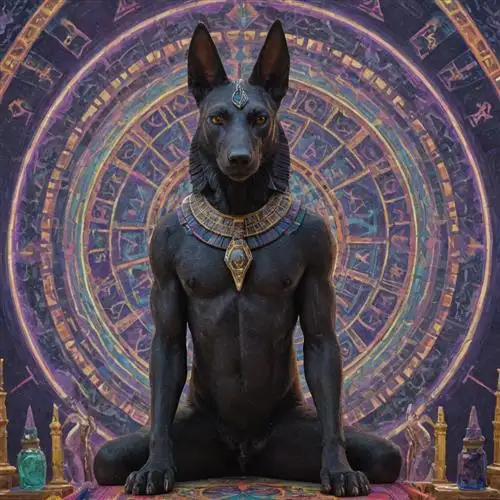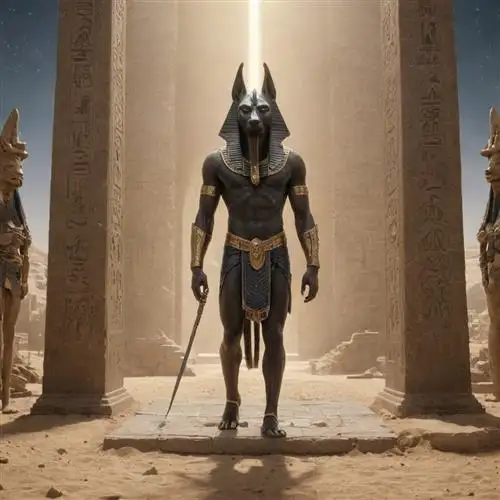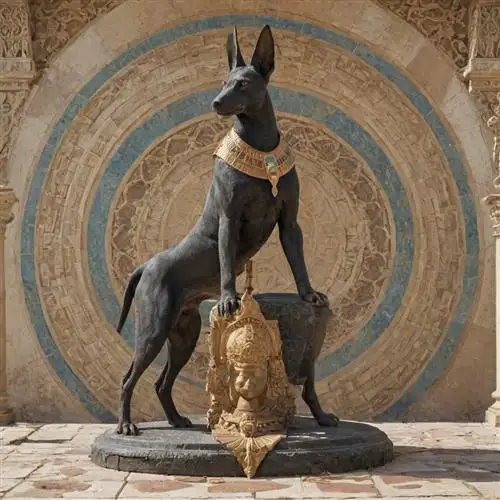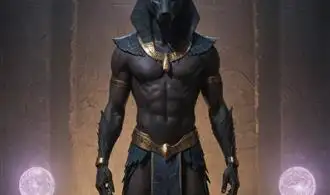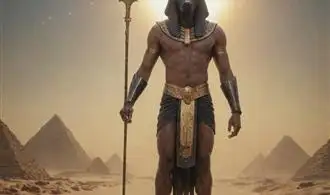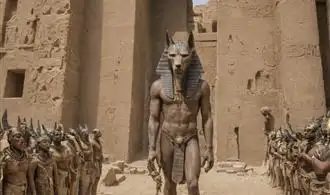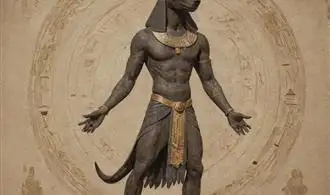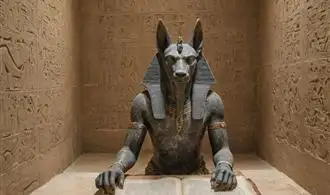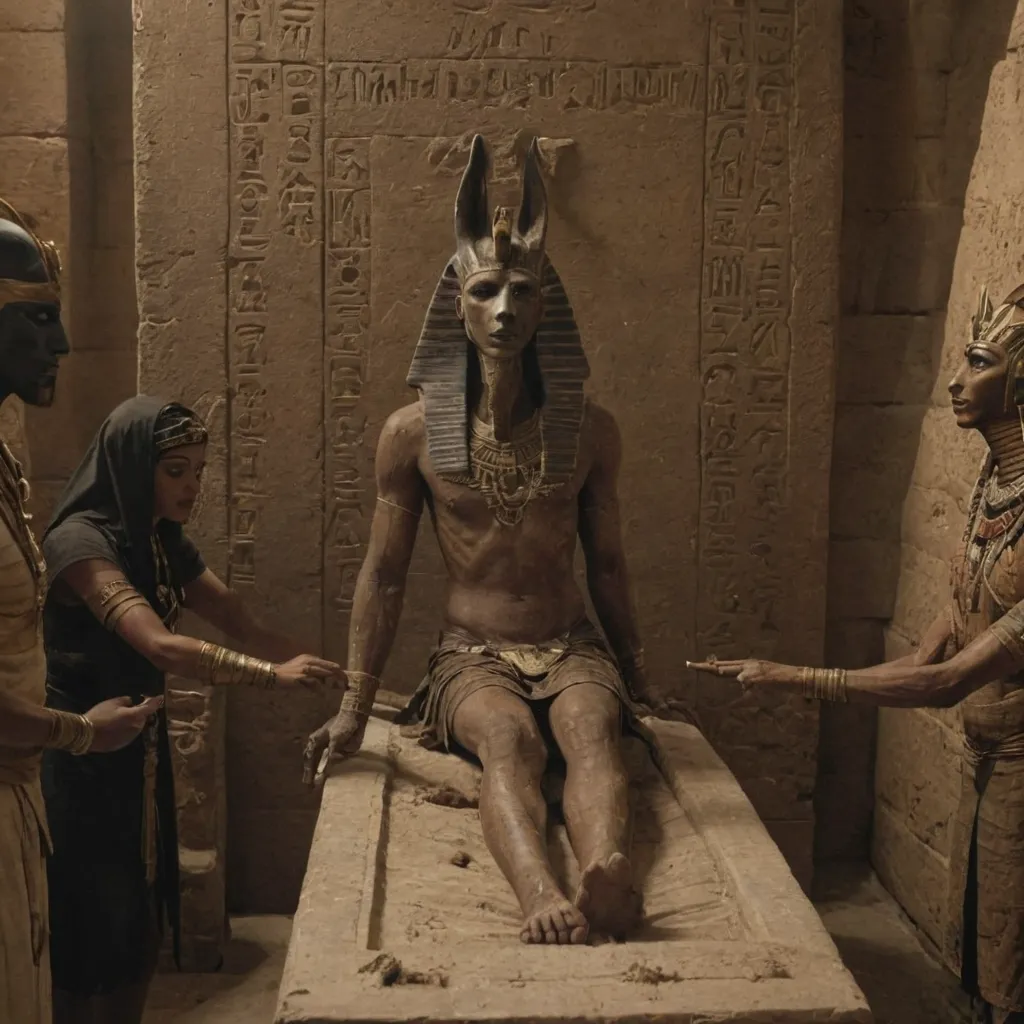
The Enigmatic Anubis and its Profound Symbolism
Anubis, the iconic Egyptian deity, stands as a profound and multifaceted symbol that transcends the confines of ancient mythology. This enigmatic figure, oft depicted with the head of a jackal, has captivated the hearts and minds of people across cultures and time periods. Delving into the intricate layers of Anubis' symbolism can unveil a transformative understanding of life, death, and the greater mysteries of the human experience.
At the core of Anubis' symbolism lies the concept of transition and transformation. As the god associated with mummification and the afterlife, Anubis presides over the critical passage from life to death, guiding the deceased through the perilous journey to the afterlife. This role as a gatekeeper, a liminal figure poised between the realms of the living and the dead, imbues Anubis with a profound sense of mystery and power.
Anubis' connection to the afterlife extends beyond mere guardianship; the deity also symbolizes the importance of proper preparation and ritual for the deceased. The meticulous process of mummification, overseen by Anubis, was believed to ensure the soul's safe passage and the preservation of the physical form. This emphasis on honoring the dead and respecting the transition to the next life speaks to the enduring human desire to find meaning and continuity in the face of mortality.
Yet, Anubis' symbolism transcends the realm of death and the afterlife. As a figure associated with judgment and the weighing of the soul, Anubis represents the importance of self-reflection, accountability, and the pursuit of a virtuous life. The Egyptian belief that the heart of the deceased would be weighed against the feather of truth, with Anubis presiding over the process, underscores the need for introspection and the cultivation of a pure spirit.
Beyond these profound associations, Anubis also symbolizes the duality of human nature, the interplay between the animalistic and the divine. The jackal-headed deity's connection to the natural world, with its predatory instincts and scavenging behaviors, serves as a reminder of the primal forces that shape the human experience. Simultaneously, Anubis' role as a guide and protector of the dead reflects the higher, more transcendent aspects of the human psyche.
Unlocking the Transformative Power of Anubis
Anubis, the revered Egyptian deity, possesses a symbolism that transcends the boundaries of ancient mythology. This powerful figure holds the key to unlocking profound personal transformations, guiding individuals on a journey of self-discovery and spiritual growth. By delving into the symbolic representation of Anubis, one can uncover the transformative power that lies at the heart of this enigmatic deity.
At the core of Anubis' symbolism is the concept of transition and transformation. As the god of mummification and the afterlife, Anubis presides over the liminal spaces between life and death, guiding the deceased through the complexities of the underworld. This symbolism can be applied to the personal journey of self-transformation, where individuals must confront their own mortality and the inevitable changes that shape their lives.
By meditating on the symbolism of Anubis, one can cultivate a deeper understanding of the cyclical nature of existence. Anubis represents the duality of life and death, and the recognition of this duality can inspire a profound sense of acceptance and resilience. Why the Symbolism of Anubis Matters More Than You Think serves as a powerful reminder that even in the face of loss and change, there is an innate potential for renewal and growth.
Anubis also symbolizes the importance of introspection and self-examination. As the guardian of the underworld, Anubis invites individuals to confront their own shadows, fears, and innermost desires. By embracing this aspect of Anubis' symbolism, one can embark on a journey of personal transformation, shedding outdated beliefs, and embracing a deeper sense of authenticity and purpose.
Furthermore, the symbolism of Anubis can serve as a powerful catalyst for personal empowerment. As the protector of the dead, Anubis represents the ability to navigate the unknown, to face the challenges of life with courage and resilience. By aligning oneself with the energy of Anubis, individuals can cultivate a greater sense of personal agency, embracing the transformative power of their own choices and actions.
Anubis Guiding the Soul Through Life's Passages
Anubis, the enigmatic jackal-headed Egyptian deity, has long been a symbol of profound significance, holding the power to profoundly influence and transform the lives of those who seek to understand its deeper meaning. As the god associated with the afterlife, embalming, and the protection of the dead, Anubis's symbolism extends far beyond the realm of the deceased, offering invaluable guidance for navigating the passages and transitions that define the human experience.
At the heart of Anubis's role as a guide for the soul lies the notion of transformation. As the deity responsible for ushering the deceased into the afterlife, Anubis represents the critical junctures where life and death intersect, where the physical and the spiritual realms converge. This powerful duality inherent in Anubis's nature serves as a potent metaphor for the transformative processes that shape our lives, from the major life events to the subtle, everyday changes that ultimately define our personal growth and evolution.
By embracing the symbolism of Anubis, individuals can tap into the profound wisdom and insight that this ancient deity offers. Anubis's presence as a guardian and protector during the journey of the soul can serve as a powerful source of comfort and strength, particularly during times of transition, loss, or profound change. The jackal-headed god's role as a psychopomp, or guide of souls, underscores the idea that even the most daunting of life's passages can be navigated with grace and resilience when one aligns with the energy and guidance of Anubis.
Furthermore, Anubis's association with embalming and the preservation of the physical form can be interpreted as a metaphor for the importance of self-care, mindfulness, and the preservation of one's own well-being. Just as Anubis meticulously prepared the deceased for the afterlife, individuals can draw inspiration from this deity to cultivate practices and habits that support their physical, emotional, and spiritual health, ensuring that they are fully equipped to weather the transformative experiences that life inevitably presents.
Embracing the Duality of Life and Death with Anubis
Anubis, the ancient Egyptian god of the dead, holds a powerful symbolism that extends far beyond the realm of mortality. As the patron of funeral rites and the protector of the deceased, Anubis represents the critical balance between life and death, a concept that can profoundly transform one's perspective and approach to living. By understanding and embodying the duality that Anubis embodies, individuals can cultivate a deeper appreciation for the cyclical nature of existence and unlock the transformative potential that lies within the interplay of these two fundamental forces.
At the heart of Anubis' significance is the acknowledgment that death is an inherent part of the human experience. Rather than viewing it as a taboo or something to be feared, Anubis encourages us to confront mortality with a sense of reverence and acceptance. This acceptance, in turn, can foster a heightened awareness of the preciousness of life and the importance of living it to the fullest. By embracing the presence of death, individuals can learn to prioritize what truly matters, let go of the trivial, and find greater meaning and purpose in their daily lives.
Anubis also symbolizes the transformative power of the transition between life and death. As the conductor of the deceased to the afterlife, Anubis represents the idea that endings often pave the way for new beginnings. This principle can be applied to various aspects of life, from the completion of one chapter to the start of another, from the shedding of old habits to the cultivation of new ones. By acknowledging the cyclical nature of existence, individuals can cultivate a more resilient and adaptable mindset, one that is better equipped to navigate the inevitable changes and challenges that life presents.
Moreover, Anubis' role as the protector of the dead and the guardian of the underworld speaks to the importance of honoring and respecting the past. By acknowledging the wisdom and experiences of those who have come before us, we can draw valuable insights and perspectives that can inform and enrich our own lives. This reverence for the past, combined with an openness to the future, allows for a more balanced and holistic approach to personal growth and transformation.
Anubis and the Ritual of Mummification: Symbolic Significance
Anubis, the jackal-headed Egyptian god, played a crucial role in the mummification process, a sacred ritual that transformed the deceased into an eternal being. This ancient practice held immense symbolic importance, reflecting the Egyptians' profound reverence for the afterlife and their belief in the continuity of the soul.
At the heart of the mummification ritual stood Anubis, the deity responsible for guiding the dead through the complex journey to the afterlife. As the patron of embalmers and the protector of the dead, Anubis oversaw every step of the mummification process, ensuring the proper preservation and preparation of the body.
The symbolic significance of Anubis's involvement in mummification can be explored through several key aspects:
- Guardianship of the Dead: Anubis was believed to be the guardian of the dead, responsible for ensuring the safe passage of the deceased into the afterlife. His presence during the mummification ritual symbolized his protective role, guiding the soul through the transition from the earthly to the divine realm.
- Transformation and Rebirth: The mummification process was seen as a transformative journey, where the physical body was preserved and prepared for the afterlife. Anubis's role in this ritual represented the belief in the rebirth and eternal life of the soul, as the deceased were believed to be reborn into a new, immortal existence.
- Weighing of the Heart: A pivotal moment in the mummification ritual was the "Weighing of the Heart," where Anubis would weigh the deceased's heart against the feather of truth. This symbolic act determined the individual's moral worthiness, and Anubis's presence during this ceremony underscored the importance of righteous living and the judgment of the soul in the afterlife.
- Embalming and Purification: Anubis oversaw the embalming process, which involved the removal of the internal organs and the preservation of the body. This ritual purification was believed to cleanse the deceased, preparing them for their journey to the afterlife under Anubis's watchful gaze.
- Symbolic Transformation: The jackal-headed form of Anubis was symbolic of his role as a liminal being, straddling the realms of the living and the dead. This unique aspect of his iconography represented the transformative nature of the mummification ritual, where the physical body was transformed into a vessel for the eternal soul.


